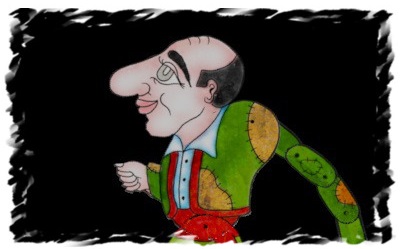Karagoz
THE CENTRAL CHARACTER of Greek Shadow Theater is Karagoz, in fact a personification of the average Greek peasant subject to Turkish rule, who faces every situation with tremendous humor. His poverty, and mostly his constant hunger, is almost philosophical, reminiscent of the cynicism of Ancient Greek philosophers. He is on one hand curious, and on the other trickster, making fun of everything that provokes his interest while at the same time unravelling his talent for self-sarcasm. He often gets into trouble, as his tongue is prone to mistakes and he is always ready to get into the affairs of others.
His big talent, thanks to his large arm, is slapping: he gives and takes slaps with tremendous ease. He is a carefree and always in a good mood, having no big dreams about the future however or a real desire to work, as he has little interest in riches. Karagoz is at peace with himself: he is internally free, and that is enough to get him through in the rough world of his times.
The main characteristics of his appearance are his anti-aesthetic hunchback, as well as his torn clothes. When first looking at him one easily understands that he lives in the margin of society, his appearance reflecting his social position. His family is equally “presentable”: his wife, Aglaia is always pregnant, whereas his three children are spitting images of his’. As for their house? It’s a derelict hut, which is in constant need of repair so as not to collapse.
“My big arm reaches out in the basket”, is his constant chant, as he is always hungry. His big arm, however, also constantly gets him into trouble, only to spare him from them a little later. On one hand his arm, and on the other his impudence, as he is never reluctant to say things as they are, even before the Turkish conqueror.
From the Turkish Karagöz to the Greek version of Karagkiozis, the figure represents the poor, seedy subject who can hardly make ends meet in the times of Turkish rule. He became very popular among the crowd, as the spectator easily identifies with his spontaneity and authenticity that is hard to find in any other character.

The Jew
The Jew Solomon is Karagoz’s houselord. He is a merchant of the court, with much wealth in his hands. He is a miser who constantly goes after Karagoz to get him to pay the rent and is always left unpaid, as Karagoz will only pay him on Saturday. The Jew’s figure has a rather funny movement on stage, as the puppet has two joints: one in the waist and one in the neck, thanks to which he always looks like he walks with his palms open and ready to receive money.
His speech is also noteworthy as the words he uses are a mix of the local language and that of the Jews of Spain that re-settled in Thessaloniki after the Decree of Alhambra, forming the community of the Romaniotes.
Kollitiri
A Karagoz clone, but in a much smaller size. It’s the oldest of the three sons of Karagoz. He is usually depicted wearing shorts and torn clothes.
The Pasha
The Pasha is often referred to as ‘the Vizier’ on stage. By convention, he always appears on the right side of the stage. He is the supreme authority, a high ranking official who represents the Sultan on a local level.
He always has a formal, authoritative air and rich clothing that reflect his high position in society.
Stavrakas
A character synonymous of the “blusterer”. Stavrakas is a figure of the interwar period, usually depicted carrying worry beads, waring sharp shoes as well as a trouser with stripes, whereas his main characteristic is his moustache. His language is filled with slang phrases.
He is easily identified as a friend of Karagoz, who displays self-confidence at first, only to end up being beaten. Much like Sir Dionysios and Morfonios, Stavrakas is a “type”, a very special form of satire reminiscent of the ages of rembetiko.
Morfonios
Morfonios or Zacharias is one of most easily recognizable figures of Greek Shadow Theater. Nature has gifted him a big head and a nose that everyone makes fun of. Yet he doesn’t seem to share the views of others regarding his ugliness, thinking he’s the big prize. Much like Stavrakas and Sir Dionysios, Morfonios is also a two-dimensional “type”, reflecting the intellect and customs of his age: he speaks using foreign words, dresses elegantly and aims high in romance by looking for women with dowry.
He often ends up being slapped by Karagoz for his lack of self-knowledge. Quite often, he faints even before receiving the slap.
Velingekas
Velingekas is the Pasha’s main guardian and protector, whose orders he obeys with no hesitation or delay. He is half Turkish and half Albanian, which justifies the fact that he uses a mix of many languages and words on stage, often ending up being incomprehensible.
On stage, he appears as the policeman that restores Karagoz to order by beating him, at times ending up being beaten by Karagoz’s uncle, Barba-Giorgos. Velingekas is therefore a personification of the Turkish rule, an authority figure that appears on stage to impose and punish.
Aglaia
The wife of Karagoz. She is in fact the personification of the poor Greek housewife that works in other households so as to feed her children that are in constant need for food. She is also in the same constant need, and always pregnant.
She doesn’t appear often on stage. Most of the times, only her voice can be heard through the hut, usually complaining about the lack of something to eat.
Sior Dionysios
This is the eptanisian voice of Shadow Theater. Sir Dionysios is an ex-Count coming from Zante. He wears a papillion, a tailcoat and a big hat.
He speaks in the dialect of Zante, mixing it with a few Italian words. Some of them are correct, whereas most of them are wrong, but in any case, he pronounces them pompously so as to express his noble origin. He is a regionalist, but also a classic islander that loves the traditions of his home island.
He is a romantic dandy, always well dressed and with elegant manners, who can barely resist his attraction for beautiful women. In the end, he usually ends up being beaten and screwing everything up.
Barba Giorgos
A true rebel at heart, Karagoz’s uncle, Barba-Giorgos is one of the many funny and easily recognizable figures of Greek Shadow Theatre.
If Karagoz is a personification of Greek cunningness, Barba-Giorgos is a personification of fighting- spirit and strength. Most of the times he appears as a deus-ex-machina to save Karagoz from Velingekas or to balance things out. When he’s not fighting, he is usually carrying cheese and other goods for his nephew’s family so as to satisfy their hunger and fill their empty bellies.
Hacivat
The second most recognizable figure of Greek Shadow Theater after Karagoz is that of Hacivat. He is the Pasha’s crier, at times even acting as a messenger.
In reality, he is a coward Greek who serves his Turkish lords out of both fear and self-interest. His constant chant reflects his role: “My good Pasha, may mighty Allah lessen my days so as to grant you extra years…”
Contrary to Karagoz’s wild spirit, Hacivat is a yes-man, at times even naïve or gullible. Karagoz’s slaps therefore come as a natural consequence of his wrong-doings.
When the two characters are on stage, they present an explosive mixture, as if being the two different sides of the same coin. Contrary to lazy Karagoz, Hacivat appears to have some positive character traits: he is always kind, rational, dignified and well-educated.
 |
Konstantinos Kartsakalis was born and raised in the United States of Fable. He studied for years in the big school of Myth, where he graduated from with a doctorate and a dragon pet. |
He lives and works under the shadow of an enchanted tree, enjoying the dew of the spring and summer months and keeping records of the history of the races of the forest. His biggest aspiration is to one day climb so high so as to hang his shoes from the moon.
Mail: info@feggaroskoni.gr

FIND US IN OUR SOCIAL MEDIA
FAIRY TALES | ADAPTATIONS | MYTHS | ARTICLES - BLOG | STORIES
© moon-flake.com (feggaroskoni.gr) 2017-2024. All rights Reserved.



